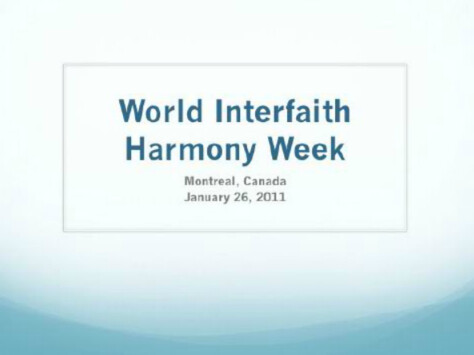Montreal, Canada - The initial UPF meeting of 2011 in Montreal was dedicated to support the World Interfaith Harmony Week inspired by the United Nations. Our meeting focused on the interfaith activities of UPF around the world, and sought to highlight the cumulative effect of so many diverse actions over the past year 2010.
Attendance included members of Jewish, Muslim, Christian, Sikh, Jain, Scientologist, Unificationist and Humanist persuasions. Participants hailed from North and Latin America, Europe, Africa, Asia, South Asia, and the Middle East.
Interfaith issues often surface in the increasingly multicultural and pluralistic societies in many of the Northern countries of the world. These issues might involve the use of religious symbols in public, e.g., the hijab, the burka, or the kirpan. They may involve the right to ethnic or religious-based legal systems which would run parallel to the existing or dominant legal system. Also, schooling in one or another tradition can cause issues regarding public funding.
In other words, there are a plethora of issues surrounding the existence of peoples of many faiths living in community together.
One such issue arose recently in Quebec, Canada, when four members of the World Sikh Organization of Canada were turned away from entering the Quebec Legislature because of the kirpans they were wearing. The kirpan is a ceremonial dagger, worn by every Sikh from childhood as a religious obligation, which has been blunted in recent years as compared with its original sharp point, as a compromise to security concerns. Nevertheless, though they came to the Quebec Parliament to support a woman’s religious right to wear a niqab in Quebec, they were unable to present their case.
One of our Sikh Ambassadors for Peace has been speaking to the issue in the media and is trying to resolve the impasse between the religious rights of minorities and the security concerns of a society unnerved by events such as the recent shooting of a legislator in Arizona, USA. Whether from terrorists or from mentally disturbed individuals, ours is increasingly a society troubled by troubled people.
Franco Famularo, Secretary General of UPF-Canada, led the meeting with an introduction to the UN initiative launching the World Interfaith Harmony Week, followed by the readings from various faith traditions, one and all masterful meditations elaborating the divinely-inspired human hope for peace.
This gathering was particularly stimulating for the participants because most had the opportunity to read a text from their respective traditions or from a famous peace figure. It demonstrated well how peace and harmony are so universally sought after by people of all faith and cultures.
Quotes of peace giants such as Mahatma Gandhi, Martin Luther King, Jr., Mother Theresa, Daw Aung San Suu Kyi, Nelson Mandela, Sun Myung Moon, and Desmond Tutu were offered for the “How-to” of becoming a peacemaker. Our Sikh representatives, Prof. Bhandari and Resham Singh, shared the words of Guru Nanak who in a way summarized the many quotes read: Mun jeetey jug jeet (“The conquest of the mind is the conquest of the world”).
Rev. Samuel King-Kabu, a Lutheran minister and long-time Ambassador for Peace, shared about his mother in Ghana who took care of a Muslim man and embraced him as one of her children. For Rev. King-Kabu, the concept of One Family under God was a reality that he experienced in his own family before he became a Christian minister many years ago. It has helped him to be open toward other faiths while at the same time nurturing his own tradition. His sharing was given as a mini-sermon that was well received by the listeners. What prevailed at the meeting was an atmosphere of mutual admiration and respect for the various expressions of faith. This augurs well for the rest of the year. A lively discussion followed.
To read Rev. King-Kabu’s speech, click here.
For a selection of readings, click here.

